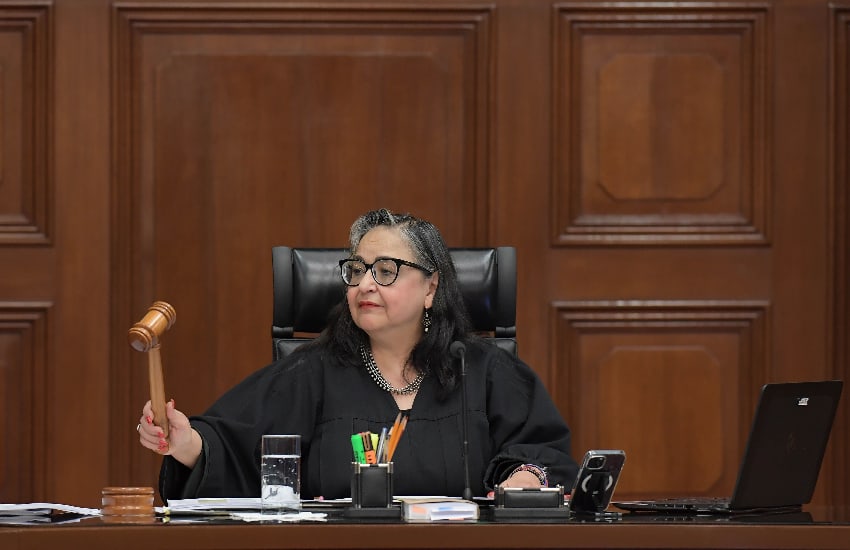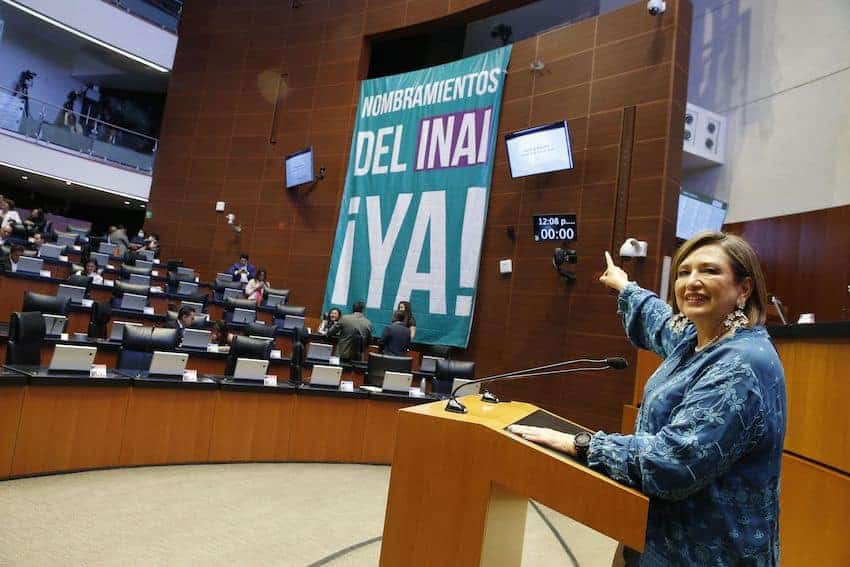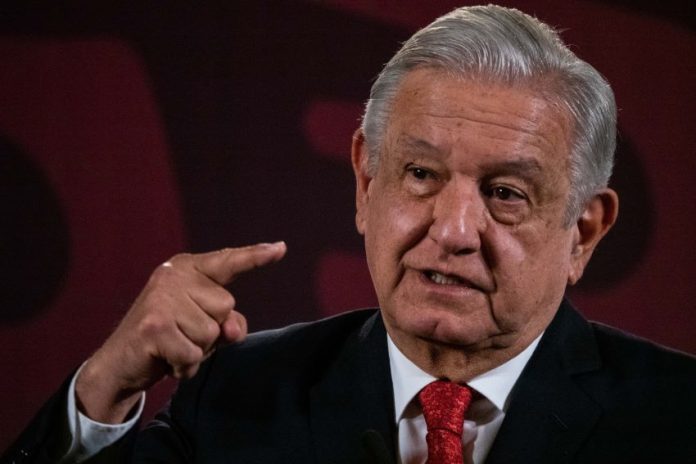President Andrés Manuel López Obrador will send at least 10 constitutional reform proposals to Congress next month as he seeks to embed major policy initiatives before he leaves office on Oct. 1, and aims — according to opposition parties — to have a bearing on the outcome of the upcoming elections.
Speaking at his morning press conference on Tuesday, López Obrador said he will submit “around 10,” but possibly as many as 20 proposals to the Congress on Feb. 5.
Via changes to the Constitution, he is aiming to increase the pensions workers receive in retirement, ensure increases to the minimum wage outpace inflation, give citizens the power to elect Supreme Court justices and other judges, reduce the number of federal lawmakers, put the National Guard under the control of the army and eliminate a range of autonomous government agencies, among other initiatives.
The ruling Morena party and its allies currently don’t have the two-thirds majority in Congress that would allow the government to push through constitutional reforms without the support of opposition lawmakers. However, that could change in September as citizens will vote to renew both houses of Congress at elections on June 2.
“Who is going to decide [whether the proposals are approved or not]? The people, because there are going to be elections,” López Obrador said Tuesday.
However, given that he intends to submit his proposals to Congress next month, lawmakers will consider them during the current congressional period, not the upcoming one that will commence Sept. 1 when deputies and senators elected on June 2 will commence their terms.

The main opposition parties — the National Action Party (PAN), the Institutional Revolutionary Party (PRI) and the Democratic Revolution Party (PRD) — have all indicated they will reject López Obrador’s proposals.
In that context, the El País newspaper reported that the president’s constitutional initiatives are “injected with the poison dart of defeat,” but have the potential to be the “electoral flag” of the ruling party as Morena presidential hopeful Claudia Sheinbaum and other Morena-backed political aspirants campaign across Mexico.
If the proposed reforms are rejected by Congress during the campaign period, López Obrador will effectively demonstrate that his initiatives can only be approved if voters support Morena party congressional candidates en masse on June 2. He could resubmit his constitutional reform proposals in September — his final month in office — if Morena and its allies succeed in winning a two-thirds congressional majority in the upcoming elections.
Lawmakers with the PAN, PRI and PRD — which together form a political alliance that is backing Xóchitl Gálvez in the presidential election — have asserted that the president’s aim in presenting his package of constitutional reforms is to influence the outcome of the upcoming elections.
PAN Deputy María Elena Pérez-Jaén, PRI Deputy Rubén Moreira and PRD Deputy Luis Espinoza are among the lawmakers who have made such claims.
Espinoza said that López Obrador is throwing an “electoral fireball” and declared that his proposed reforms won’t pass Congress. “Don’t bother sending them,” he added.
Plan to eliminate autonomous bodies meets significant opposition
The reform proposal that is generating the most controversy this week is López Obrador’s plan to disband autonomous agencies, an objective he has long spoken about, but not achieved.
“In the package of reform initiatives, I’m going to propose that all these organizations that were created to protect individuals and [negatively] affect the public interest disappear,” the president said Thursday.
Previous governments “needed to protect themselves and that’s why they established all these supposedly autonomous institutions,” he said.
On Friday, López Obrador said that his goal was to disband around 10 autonomous agencies “that were created to legalize corruption.”
Among those he would like to see disbanded are the National Institute for Transparency, Access to Information and the Protection of Personal Data (INAI), the Federal Telecommunications Institute, the Federal Economic Competition Commission (Cofece) and the Energy Regulatory Commission.
López Obrador on Thursday touted the savings that would come from getting rid of “factious, burdensome [and] unpopular” autonomous agencies, although he said Friday that “we’re not going to fire anyone” because employees will be absorbed into other government departments.

The president has previously faced widespread opposition to his plan to eliminate autonomous government bodies, and it was no different this week.
“López Obrador will hit a wall because Mexico has the National Action Party and we will not permit his golden dream of ‘sending the institutions to hell,'” PAN national president Marko Cortés wrote on the X social media platform.
“Our country is not a dictatorship. The autonomous bodies are a fundamental counterbalance for our democracy. … President, stop trying to destroy everything that makes you uncomfortable, criticizes you or gets in the way of you gaining more power,” he said.
Miguel Flores Bernés, president of the economic competition commission at the Mexico branch of the International Chamber of Commerce, said that Cofece, Mexico’s antitrust agency, is in fact an “ally” of the president as it is “fighting every day to dismantle all the agreements … between businesspeople to raise prices.”
Jorge Bravo, president of the Mexican Association for the Right to Information, was also critical of López Obrador’s plan, arguing that autonomous agencies protect a range of “fundamental rights” of citizens.
Instead of getting rid of such bodies, “we need to strengthen them,” said José Abugaber, president of the the Confederation of Industrial Chambers, adding that doing so would benefit “transparency and democratic life” in Mexico.
AMLO’s other reform proposals
López Obrador frequently claims that Mexico’s judiciary is “at the service of a greedy and corrupt minority” of Mexican society as well as the country’s “conservative” political parties.
He asserts that the nation’s judicial system needs to be overhauled, and believes that allowing citizens to elect Supreme Court justices and other judges is a key part of that process.

Ordinary citizens must contribute to the “renewal” of the judicial branch, López Obrador said when speaking about his proposal last May. “The people are the ones who can purify public life,” he added.
Arturo Zaldívar, a former Supreme Court justice who resigned from that position to join Sheinbaum’s campaign, expressed support for the proposal earlier this week, but said that only suitably qualified people should be permitted to stand as candidates for judicial positions.
López Obarador’s proposal to change the Constitution to allow the army to take control of the National Guard seeks to restore a previous state of affairs.
The government placed the security force under the complete control of the army in late 2022 after the Congress approved legislation that allowed it to do so, but the Supreme Court ruled last April that the transfer of responsibility from the civilian Security Ministry to the Defense Ministry was unconstitutional.
The president’s proposal to reduce the number of lawmakers by getting rid of plurinominal deputies and senators — positions that are assigned proportionally to parties that attract support from at least 2% of voters — was part of his ambitious electoral reform package that was rejected by Congress in late 2022.
López Obrador subsequently succeeded in getting his so-called “Plan B” electoral reform proposal through Congress, but it was struck down by the Supreme Court in the middle of last year.
Early next month, the president also plans to submit proposals to Congress related to government austerity, the national rail system — on which he hopes passenger trains will run widely in the near future — and welfare programs.
López Obrador said last year that he intended to wait until September to submit constitutional reform proposals to Congress, but has evidently changed his mind — for electoral reasons, if opposition lawmakers are to be believed.
He has long made it clear that Morena and its allies need a congressional “supermajority” to fully execute the “transformation” of Mexico he claims he and his government have begun.
“You have to vote not just for the [Morena] candidate for president, you have to vote for the lawmakers, the candidates for deputies and senators, so that the transformation has a qualified majority,” López Obrador said last May.
With reports from El Economista, El País, El Universal, El Financiero and Aristegui Noticias
